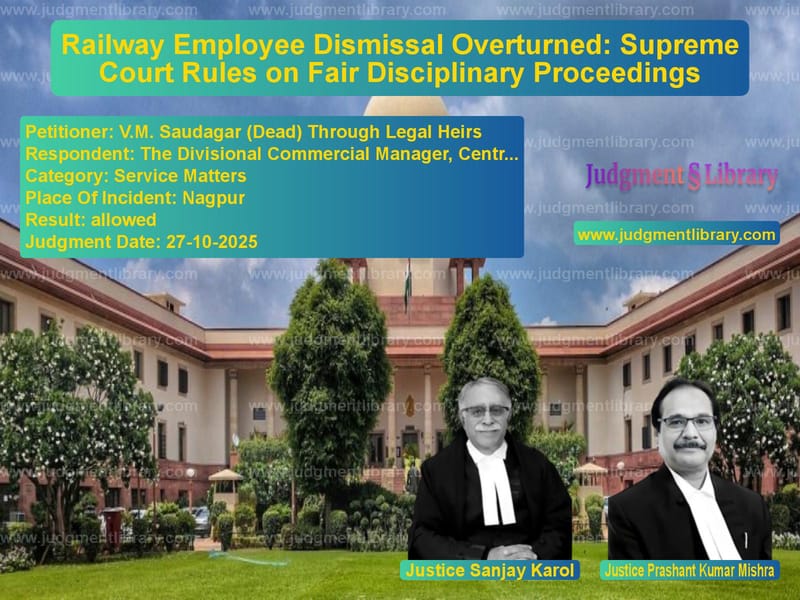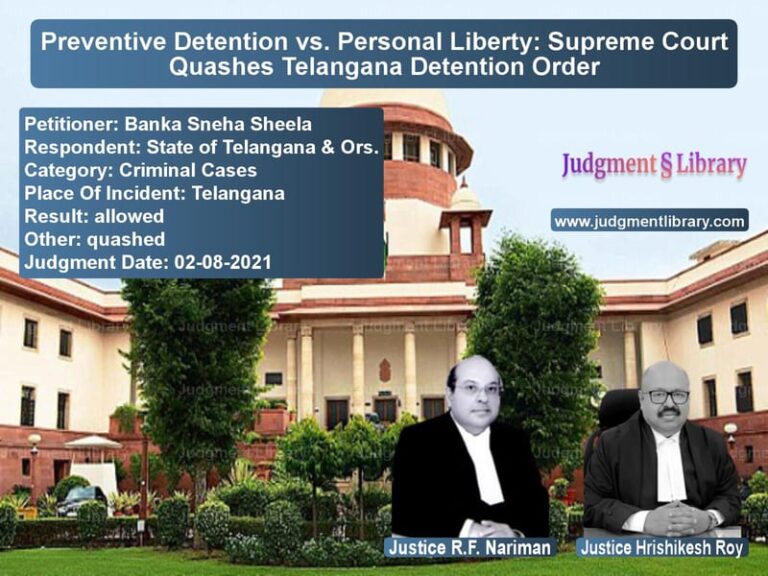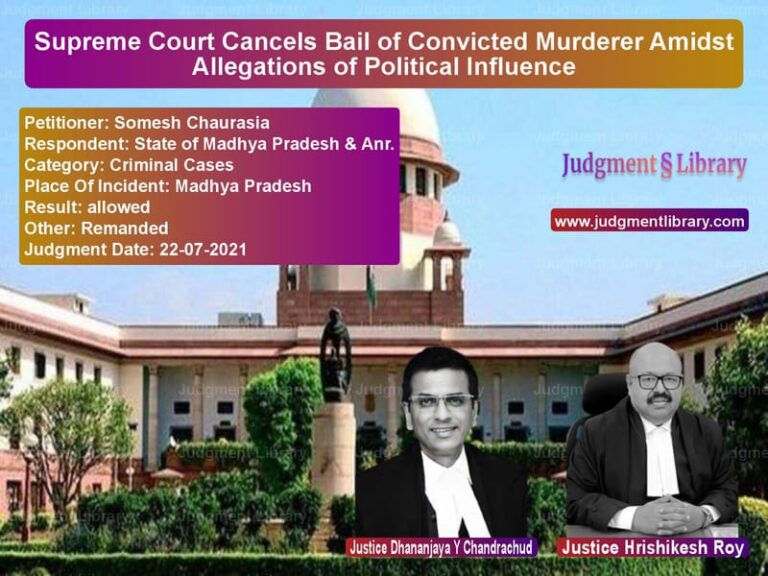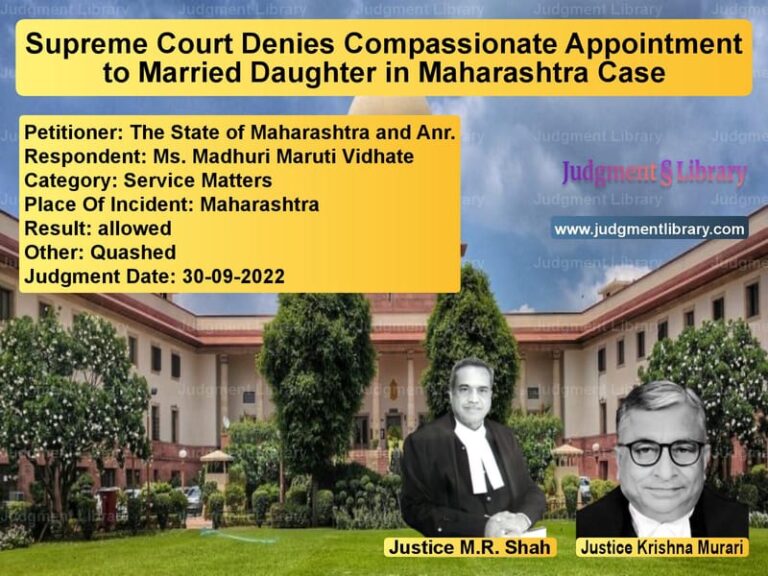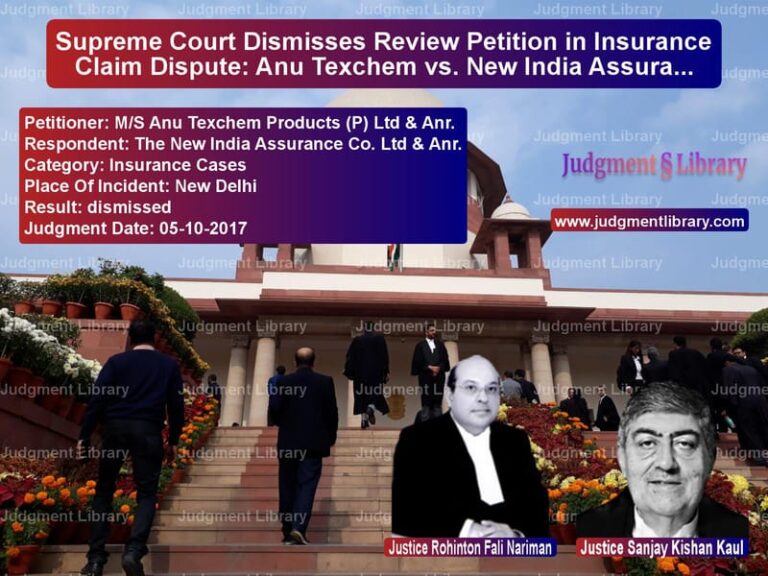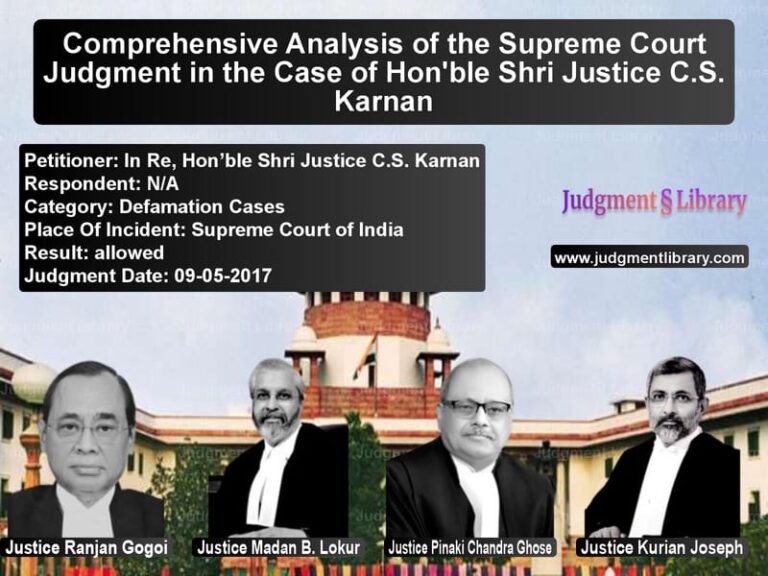Railway Employee Dismissal Overturned: Supreme Court Rules on Fair Disciplinary Proceedings
In a significant ruling that underscores the importance of fair disciplinary proceedings in government service, the Supreme Court of India has restored the order of the Central Administrative Tribunal setting aside the dismissal of a railway employee who had been accused of corruption and misconduct. The case, which spanned over 37 years, involved a Travelling Ticket Examiner who was dismissed from service following a surprise check by the railway vigilance team in 1988. The judgment delivered by Justices Sanjay Karol and Prashant Kumar Mishra on October 27, 2025, brings closure to a long-standing legal battle that continued even after the employee’s death, with his legal heirs pursuing the matter to secure his posthumous vindication and consequential benefits.
The Supreme Court’s detailed examination of the evidence revealed serious flaws in the departmental enquiry that led to the employee’s dismissal. The Court found that the enquiry officer had relied on statements of witnesses who did not support the charges, failed to examine crucial witnesses, and drew conclusions that were not supported by evidence. This case serves as an important precedent regarding the standards of evidence required in departmental proceedings and the scope of judicial review in such matters.
The Factual Background
The case originated from an incident on May 31, 1988, when the appellant, V.M. Saudagar, was serving as a Travelling Ticket Examiner in the Second Class Sleeper Coach of the 39-Down Dadar-Nagpur Express. A surprise check was conducted by the Railway vigilance team, which led to several allegations against him. The primary charge was that he had demanded illegal gratification from three passengers – Rs. 25 from Hemant Kumar, unrefunded Rs. 20 from Dinesh Choudhary, and unrefunded Rs. 5 from Rajkumar Jaiswal – for the allotment of berths. Additional charges included being found in possession of excess cash of Rs. 1254 (excluding personal and railway cash), failure to recover Rs. 18 as fare difference from a passenger, and forging a duty card pass by extending its validity without authority.
Based on these allegations, a charge-sheet was issued against the appellant on July 3, 1989, under the Railway Services (Conduct) Rules, 1966, and a departmental enquiry was initiated. The enquiry officer submitted his report on December 31, 1995, holding that all charges were proved against the appellant. Accepting this report, the Divisional Commercial Manager, Nagpur, imposed the penalty of dismissal from service on June 7, 1996. The appellant’s departmental appeal was dismissed on July 30, 1997, following which he approached the Central Administrative Tribunal.
The Legal Journey
The Central Administrative Tribunal, Mumbai Bench, in its order dated March 21, 2002, quashed the dismissal order and directed the appellant’s reinstatement with all consequential benefits. The Tribunal found serious flaws in the enquiry proceedings and the evidence relied upon to prove the charges. However, the railway authorities challenged this decision before the Bombay High Court, which stayed the Tribunal’s direction for reinstatement. Ultimately, on September 21, 2017, the High Court allowed the railway’s writ petition, set aside the Tribunal’s decision, and upheld the dismissal of the appellant from service. Tragically, during the pendency of the writ petition before the High Court, the appellant passed away, and his legal heirs pursued the matter before the Supreme Court.
The Supreme Court’s Analysis of Charges
The Supreme Court undertook a detailed examination of each charge against the appellant and found them all lacking in evidentiary support. Regarding the first charge of demanding illegal gratification from three passengers, the Court noted that one of the passengers, Hemant Kumar, was not examined during the enquiry and thus his statement was never subjected to cross-examination. The other two passengers, Dinesh Choudhary and Rajkumar Jaiswal, did not support the charges against the appellant during their examination.
The Court specifically noted the statements of these witnesses. In response to a specific question as to whether the appellant demanded illegal gratification of Rs. 20 from Dinesh Choudhary for allotment of berths, the witness categorically stated that “the appellant had not demanded any illegal gratification and that the appellant had categorically told that he would return the balance amount and would give a receipt afterwards as he was to attend 2-3 Coaches.” In reply to another question, he again reiterated that “the appellant never demanded any illegal gratification.”
Read also: https://judgmentlibrary.com/supreme-court-resolves-telangana-judicial-service-recruitment-dispute/
Similarly, the statement of Rajkumar Jaiswal was found to be full of contradictions. The Court observed that “the charge is of paying Rs. 50; however, the receipt issued by the appellant for the same was of Rs. 45. But Rajkumar Jaiswal deposed that he had made payment of Rs. 120 to the appellant. Thus, his statement is contrary to the charge itself.” The Court also noted that the Enquiry Officer relied upon the statement of Hemant Kumar even though he was not examined during the enquiry and was thus not subjected to cross-examination.
Regarding the second charge of being found in possession of excess undeclared cash amounting to Rs. 1254, the Court noted that the appellant had deposited the said amount in the Railway Sundry Accounts on the date of the incident. Moreover, no official document had been placed before the Enquiry Officer to substantiate this charge. The respondents had placed reliance on a circular dated August 22, 1997, issued by the Railway Board, but the Court agreed with the Tribunal’s reasoning for not accepting this circular since it was issued after the date of the incident.
Concerning the third charge of failing to recover a difference of fare of Rs. 18 from a passenger, the Court found that this charge was proved merely on the basis of the statement of the Vigilance Inspector, ignoring the fact that the passenger bearing the said ticket number had not been examined and the excess fare receipt book highlighting the amount of Rs. 18 had not been produced before the Enquiry Officer.
As for the fourth charge of forging signatures to extend the validity of his duty card pass, the Court noted that this charge was found not proved by the Enquiry Officer himself. No evidence had been adduced to prove the charge of forgery, and the alleged forged signature had not been sent to a handwriting expert for verification.
The Parties’ Arguments
The learned counsel for the appellants submitted that “the impugned judgment of High Court is legally unsustainable as it reverses a well-reasoned order passed by CAT. The penalty order was a mere mechanical reproduction of the Enquiry Officer’s report without any independent application of mind.” He vehemently argued that “the primary complainant-Hemant Kumar, whose written statement formed the basis of the charge of illegal gratification, was not examined during the enquiry and his statement was never subjected to cross-examination. Therefore, placing reliance on such a material, without affording the appellant an opportunity of testing it, constituted denial of a fair hearing.”
Regarding the other charges, the counsel argued that “the possession of Rs. 1254 on 31.05.1988 was not misconduct, as there was no rule prescribing a ceiling on the cash a Travelling Ticket Examiner could carry” and that “the amount was duly deposited in the Railway Sundry Accounts and no allegation of misappropriation was made or proved.”
On the other side, the learned Additional Solicitor General for the respondents submitted that “the order of dismissal was a reasoned and speaking order passed after giving the appellant adequate opportunity of defence, strictly adhering to the principles of natural justice.” He argued that “the findings reached by the Enquiry Officer were supported by reasons and the Disciplinary Authority, after due application of mind, imposed the penalty of dismissal. Therefore, CAT ought not to have interfered with the findings.” In respect of the non-examination of Hemant Kumar, it was argued that “the same does not render the enquiry against the appellant as invalid.”
The Supreme Court’s Final Ruling
After examining all aspects of the case, the Supreme Court concluded that “all the charges have not been found to be proved conclusively against the appellant and CAT, on the basis of the material on record, had rightly interfered with the penalty of dismissal from service against the appellant.” The Court held that “the High Court has failed to take note of the legal position that when the findings of the Enquiry Officer were perverse basing on completely misleading of the materials produced before the Enquiry Officer, CAT was fully justified in setting aside the order of penalty.”
Taking note of the fact that the incident happened on May 31, 1988, more than 37 years back, and that the delinquent employee had passed away during the pendency of the proceedings, the Court directed that “all the consequential monetary benefits including pensionary benefits shall be released in favour of the appellants who are legal heirs of the deceased employee within a period of three months from today.”
This judgment reinforces the principle that disciplinary proceedings must be conducted with fairness and proper evidentiary standards, even in cases involving serious allegations of corruption. The Supreme Court’s intervention in setting aside the High Court’s judgment and restoring the Tribunal’s order highlights the importance of substantive justice over procedural technicalities, particularly in cases where the evidence does not support the conclusions drawn by the disciplinary authorities.
Petitioner Name: V.M. Saudagar (Dead) Through Legal Heirs.Respondent Name: The Divisional Commercial Manager, Central Railway & Anr..Judgment By: Justice Sanjay Karol, Justice Prashant Kumar Mishra.Place Of Incident: Nagpur.Judgment Date: 27-10-2025.Result: allowed.
Don’t miss out on the full details! Download the complete judgment in PDF format below and gain valuable insights instantly!
Download Judgment: v.m.-saudagar-(dead)-vs-the-divisional-comme-supreme-court-of-india-judgment-dated-27-10-2025.pdf
Directly Download Judgment: Directly download this Judgment
See all petitions in Employment Disputes
See all petitions in Disciplinary Proceedings
See all petitions in Termination Cases
See all petitions in Public Sector Employees
See all petitions in Pension and Gratuity
See all petitions in Judgment by Sanjay Karol
See all petitions in Judgment by Prashant Kumar Mishra
See all petitions in allowed
See all petitions in supreme court of India judgments October 2025
See all petitions in 2025 judgments
See all posts in Service Matters Category
See all allowed petitions in Service Matters Category
See all Dismissed petitions in Service Matters Category
See all partially allowed petitions in Service Matters Category

